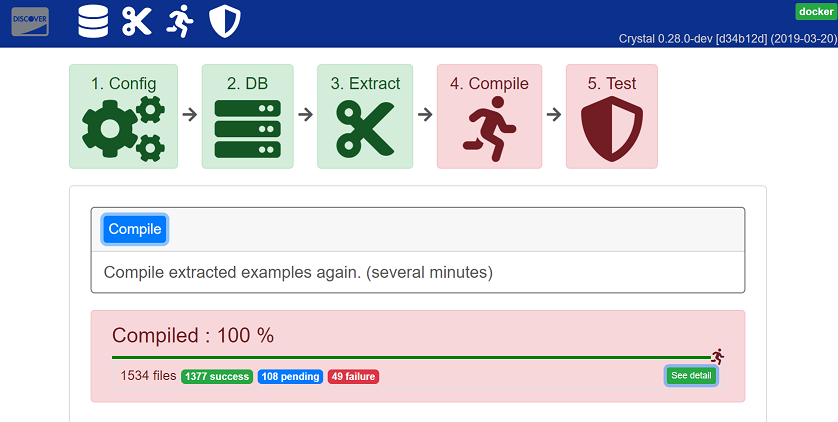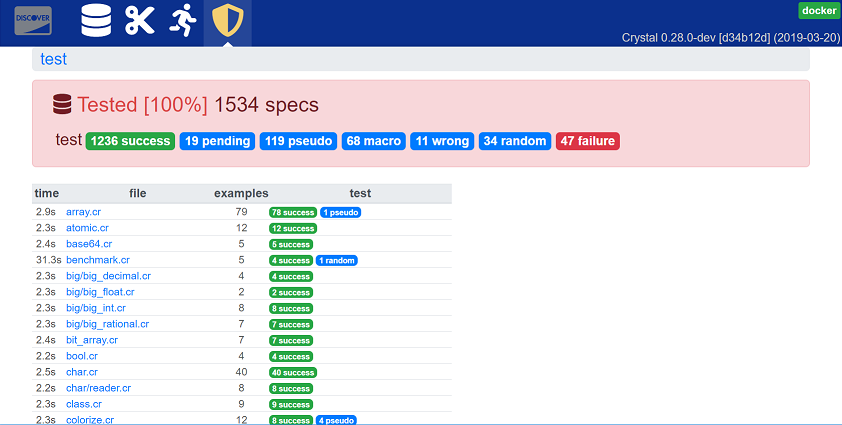crystal examples checker
In addition to the standard crystal literals, the following literals may be used for comments.
x # raises FooError
x # => 10.00:00:00.000010000
x # => UUID(ba714f86-cac6-42c7-8956-bcf5105e1b81)
x # => 2016-02-15 04:35:50.0 UTC
x # => NaN
x # => #<Foo>
x # => Foo(@a=1, @b=1.0)crystal-examples: linux x86_64 static binary is availabledocker compose
First, specify a working directory and initialize or upgrade. Be careful when specifying an existing directory, as files such as Makefiles will be overwritten.
$ crystal-examples setup .
Setting up working directory in ./
ok /tmp/work
create Makefile
create config.toml
create compose.yaml
create examples.db
create crystal-examples # 0.3.1 [51d73b1] (2019-03-20)
not found crystal/src
...
not found ./crystal/bin/crystal # (compiled compiler)
...Second, prepare source directory. In general, run as follows.
$ git clone https://github.com/crystal-lang/crystal.gitHere, crsytal/src should be in subdir because compiler will work in docker container which mounts "./".
Then, prepare crystal compiler. There are three choices.
Build ./crystal/.build/crystal if it's first time for the ./crystal src.
$ make crystalUpdate the value of bin to just crystal.
$ vi config.toml
bin = "crystal" # use system compilerSame above, you can use any compiler by updating bin in config.toml.
Note that it will be used in docker container.
make web runs web server at 0.0.0.0:8080 in docker container.
$ make web
[production] Kemal is ready to lead at http://0.0.0.0:8080If you want to change setting like listen port, edit config.toml.
a relative path from crystal src dir to the src file.
For example, array.cr, http/client.cr.
one code block written in src as comment.
src: its srcseq: sequence number of the comment blocks in the srcline: line number of the comment block in the srctype: type of comment block (ex.json,crystal)code: content of the comment block
[] of Int32 # same as Array(Int32)
[] # syntax errorsha1: SHA1 message digest for the codecompiled: status cache about compilingtested: status cache about testing
compile cache of Example
src,seq: the primary key for theExampleexit_code: exit code of compiling processlog: stdout and stderr of compiling
test cache of Example
src,seq: the primary key for theExampleexit_code: exit code of testing processlog: stdout and stderr of testing
Accumulated heuristics for example code execution.
action: heuristic type (require,compile,test)target: heuristic target (file name or SHA1 of the code)by: heuristic argument
It is serialized into the following string.
compile 081fe59b04... by:pseudo ...
require digest/base.cr by:digest ...
test fa5a9799... by:random ...
There are various types of sample code.
lib LibTicker
fun on_tick(callback : (Int32, Void* ->), data : Void*)
endFileUtils.ln("/usr/bin/vim", "/usr/bin/emacs")Is this pseudo code? Is this the real code we should test? Ideally the sample code should be annotated at this point.
# @[Test]
# ```crystal
# [:foo, :bar].size # => 2
# ```At present, we are responding each time by accumulating empirical knowledge by manual housekeeping in bundled/heuristic.jnl.
Crystal often broke the stdlib API compatibility, especially Time, at each release.
For example, we have an example code like this.
time = Time.utc(2016, 2, 15, 10, 20, 30)
time.to_s # => 2016-02-15 10:20:30 UTCOur inner module CommentSpec convert this as follows.
time.to_s.should eq( Time.parse("2016-02-15 10:20:30 UTC", "%F %T %z") )However, there is no guarantee that Time.parse and Time.new will work with the current crystal version, and there is no alias for backwards compatibility.
This is preventing the use within CI and automation.
docker compose is needed in development too.
$ make- Fork it ( https://github.com/maiha/crystal-examples/fork )
- Create your feature branch (git checkout -b my-new-feature)
- Commit your changes (git commit -am 'Add some feature')
- Push to the branch (git push origin my-new-feature)
- Create a new Pull Request
- maiha maiha - creator, maintainer


